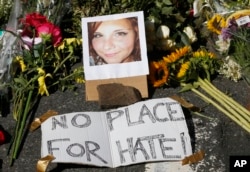President Donald Trump says the corporate chief executives who quit his advisory manufacturing council are “leaving out of embarrassment” for manufacturing products outside the U.S.
Trump told reporters in New York that the CEOs are not taking their jobs seriously when it comes to domestic production.
He said he has been lecturing them on what he says is the need to bring manufacturing back to the United States.
Kenneth Frazier, the chief executive of Merck Pharmaceuticals, CEO Kevin Plank of the Under Armour sporting goods company, and Brian Krzanich, who heads the technology giant Intel, all quit Trump’s American Manufacturing Council on Monday. They were joined Tuesday by Scott Paul of the Alliance for American Manufacturing, as well as AFL-CIO President Richard Trumka and the group’s Deputy Chief of Staff Thea Lee.
They indicated they left the council to protest Trump’s response to Saturday’s deadly racial violence in Charlottesville, Virginia, believing the president’s early condemnation of racism to be weak.
'Grandstanders'
Trump belittled the departures with a pointed retort on his Twitter account.
“For every CEO that drops out of the Manufacturing Council, I have many to take their place. Grandstanders should not have gone on. JOBS!” he said.
Trumka and Lee said in announcing their resignations that they cannot be a part of a council for a president who “tolerates bigotry and domestic terrorism” and that the group was never an effective way to help workers.
“From hollow councils to bad policy and embracing bigotry, the actions of this administration have consistently failed working people,” they said in a joint statement.
Trump’s initial remarks about the Charlottesville protest condemned the violence between white nationalists and counterprotesters, but did not single out neo-Nazis, the Ku Klux Klan and other hate groups by name. Instead, Trump said the unrest was caused by “many sides.”
He used the words neo-Nazis, KKK, and white supremacists when he made more explicit remarks two days later. But many critics said those words denouncing racism came too late, and he drew more ire Tuesday when he again addressed the issue and reasserted “there is blame on both sides.”
“President Trump’s remarks today repudiate his forced remarks yesterday about the KKK and neo-Nazis,” AFL-CIO’s Trumka and Lee said, adding that American workers “reject all notions of legitimacy of these bigoted groups.”
One woman was killed during the white nationalists’ protest of Charlottesville’s planned removal of a statue of Confederate General Robert E. Lee. Lee commanded rebel forces in the U.S. Civil War. The war was fought between 1861 and 1865 and was largely over Southern states’ demand to continue slavery.
Heather Heyer was killed when a white nationalist demonstrator drove his car at high speed into a crowd of counterprotesters in Charlottesville.
Formerly a 'business genius'
Merck chief Frazier said in quitting the council that Trump initially did not “clearly reject expressions of hatred, bigotry and group supremacy, which run counter to the American ideal that all people are created equal.”
Trump in July called Frazier a “business genius,” but when he quit the manufacturing council, Trump, in less than a hour, said on Twitter that since he had left the panel he would now “have more time to LOWER RIPOFF DRUG PRICES!”
Under Armour company’s Plank tweeted that he quit the council because he would rather unite people and promote diversity through the power of sports, not politics.
Intel’s Krzanich said he was resigning to highlight the “serious harm our divided political climate is causing to critical issues. I resigned because I want to make progress, while many in Washington seem more concerned with attacking anyone who disagrees with them. We should honor — not attack — those who have stood up for equality and other cherished American values.”
Paul, of the manufacturing lobbying group, said, “I’m resigning from the Manufacturing Jobs Initiative because it’s the right thing for me to do.”
Doug McMillon, chief executive of the world’s largest retailer Walmart, is not a part of the council, but joined the other executives in rebuking Trump Tuesday.
McMillon said Trump “missed a critical opportunity to help bring our country together by unequivocally rejecting the appalling actions of white supremacists.”





